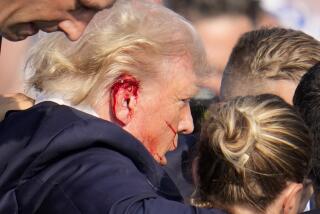James Brady’s death ruled a homicide 33 years after he was shot

A northern Virginia medical examiner ruled that the gunshot that injured James Brady 33 years ago caused his death earlier this week. Times staff writer James Queally explains the coroner’s decision.
- Share via
The death of James Brady has been ruled a homicide after a Virginia medical examiner’s office determined the gunshot wound he suffered in 1981 led to his death earlier this week, police officials told the Los Angeles Times.
Gwendolyn Crump, chief spokeswoman for the District of Columbia Metropolitan Police Department, said a Northern Virginia medical examiner determined the 1981 gunfire that left Brady permanently paralyzed and set him on a path to become the face of the gun-control movement ultimately caused his death.
Brady died Monday in Alexandria, Va., after a series of health issues. He was 73.
It was not immediately clear whether John Hinckley Jr., who has been a patient in a psychiatric facility since standing trial and being found not guilty by reason of insanity decades ago, could face any additional charges based on the ruling.
In a news release, police said the injuries Brady sustained in the 1981 shooting contributed to his death. The police department’s homicide division, the U.S. Attorney’s Office and the Federal Bureau of Investigation are reviewing the case.
“At this time, it has not been determined whether new charges will be brought,” Crump told The Times.
Brady had been serving as President Ronald Reagan’s press secretary for just a few months when Hinckley aimed a series of gunshots at the president. Brady was shot in the head, and Reagan was wounded.
A police officer and a Secret Service agent were also injured, but Brady suffered the longest-lasting injuries when a bullet passed through his forehead and pierced the right side of his brain.
He suffered partial paralysis and permanently slurred speech, but when he left the Reagan administration, Brady became one of the nation’s foremost gun-control advocates.
The Brady Handgun Violence Prevention Act was passed in 1993, which required gun buyers to undergo background checks and go through five-day waiting periods before purchasing firearms.
Hinckley, now 59, was sent to St. Elizabeth’s Hospital after being found not guilty by reason of insanity of charges related to the shooting. In recent years, he has been allowed to leave the hospital for visits with his mother, who lives in Williamsburg, Va., according to court records reported on last year by former Times reporter Wes Venteicher.
Hinckley has been monitored by the Secret Service and the agency has kept detailed records of where Hinckley goes, what he eats, sites he visits online and what he wears, according to records.
Follow @JamesQueallyLAT for breaking news
More to Read
Sign up for Essential California
The most important California stories and recommendations in your inbox every morning.
You may occasionally receive promotional content from the Los Angeles Times.














